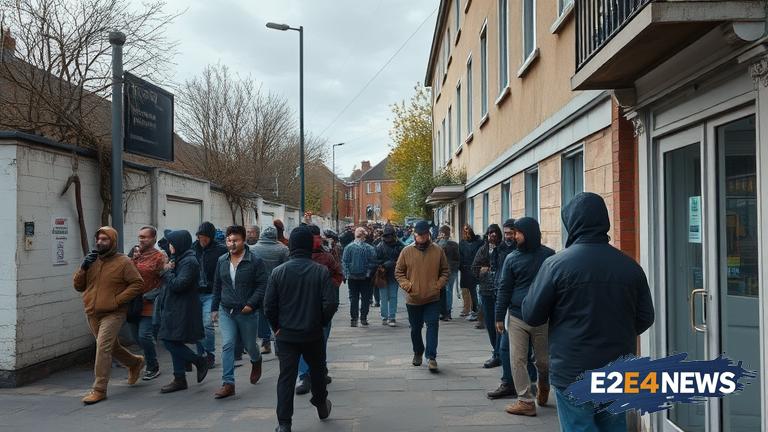The United Kingdom has witnessed a surge in protests against migrant hotels, with demonstrations taking place in various parts of the country. The protests, which have been ongoing for several weeks, have drawn attention to the growing concern over immigration and housing in the UK. The migrant hotel controversy has sparked heated debates, with some arguing that the government’s decision to house asylum seekers in hotels is a waste of taxpayer money, while others claim that it is a necessary measure to provide shelter for those seeking refuge. The protests have been largely peaceful, but there have been reports of clashes between protesters and police. The UK government has faced criticism for its handling of the migrant crisis, with some accusing it of failing to provide adequate housing and support for asylum seekers. The migrant hotel protests have also raised questions about the impact of immigration on local communities, with some residents expressing concerns about the strain on resources and services. Despite the controversy, many have come out in support of the asylum seekers, arguing that they deserve to be treated with dignity and respect. The UK has a long history of providing refuge to those fleeing persecution and war, and many believe that it is essential to continue this tradition. However, others argue that the country’s immigration system is in need of reform, and that the government must do more to address the root causes of migration. The migrant hotel protests have highlighted the complexities of the issue, and the need for a nuanced and compassionate approach to addressing the needs of asylum seekers. The UK government has announced plans to reform the immigration system, but it remains to be seen whether these reforms will address the concerns of all parties involved. In the meantime, the protests are likely to continue, with many calling for greater transparency and accountability in the government’s handling of the migrant crisis. The migrant hotel controversy has also sparked a wider debate about the role of hotels in housing asylum seekers, with some arguing that it is not an appropriate or sustainable solution. Others have pointed out that the use of hotels is a temporary measure, and that the government is working to find more permanent solutions. The protests have also raised questions about the impact of migration on local economies, with some arguing that it can bring significant benefits, while others claim that it can put a strain on resources. Despite the challenges, many believe that the UK has a moral obligation to provide refuge to those in need, and that it is essential to find a solution that balances the needs of all parties involved. The migrant hotel protests are a reminder that the issue of migration is complex and multifaceted, and that it requires a thoughtful and compassionate approach. As the debate continues, it is essential to listen to the perspectives of all parties involved, and to work towards finding a solution that is fair, sustainable, and humane. The UK government must also do more to address the root causes of migration, and to provide support to those who are seeking refuge. This includes providing adequate housing, access to education and employment, and ensuring that the rights of asylum seekers are protected. By working together, it is possible to find a solution that benefits everyone, and that upholds the UK’s tradition of providing refuge to those in need. The migrant hotel protests are a call to action, and a reminder that the issue of migration requires a comprehensive and compassionate approach. The UK government must respond to the concerns of all parties involved, and work towards finding a solution that is fair, sustainable, and humane. The protests are likely to continue, but by listening to the perspectives of all parties involved, it is possible to find a way forward that benefits everyone. The migrant hotel controversy has highlighted the need for a nuanced and thoughtful approach to addressing the needs of asylum seekers, and the importance of finding a solution that balances the needs of all parties involved. The UK government must do more to address the root causes of migration, and to provide support to those who are seeking refuge. This includes providing adequate housing, access to education and employment, and ensuring that the rights of asylum seekers are protected. By working together, it is possible to find a solution that benefits everyone, and that upholds the UK’s tradition of providing refuge to those in need.
